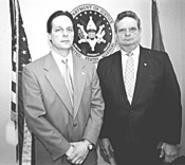Wanted for kidnapping and gross sexual imposition, he eluded Medina County sheriff's deputies for two months by renting different motel rooms. It was a predictable move, but enough in a county where deputies only hunt wanted criminals a few nights a week.
In March, the sheriff transferred Clifford's case to U.S. Marshal Pete Elliott's Violent Fugitives Task Force. Elliott's deputies staked out the home of Clifford's mother. They hounded his friends, reminding them how much jail time they could get for aiding and abetting. This left Clifford nowhere to go when his money ran out, so he took to sleeping in his Kia Sportage.
After six days, an exhausted and cold Clifford called the marshal from a pay phone in Streetsboro to talk about surrendering, then changed his mind and bolted. Marshals deputy John Bodovetz arrived at the phone minutes later. He found Clifford parked across the street. The fugitive gunned the Kia and fled. Minutes later, his gas tank nearly empty, Clifford pulled into a parking lot and surrendered.
"This was the kind of case that we work 24 hours a day, seven days a week, until the guy is caught," Bodovetz says. "It was just a matter of time."
A hundred fifty years ago, the U.S. Marshals Service made a name for itself hunting bad guys across the western frontier. But somewhere along the line, marshals stopped acting like marshals. They spent their days shuttling criminals from jail to federal court, acting as glorified bailiffs.
On the edge of downtown Cleveland, in the curving white tower that houses northern Ohio's federal district court, the pendulum is swinging again. Since becoming a U.S. Marshal a year ago, Pete Elliott Jr. has transformed the position from an overlooked backwater of the federal judiciary into the region's most dynamic law-enforcement agency. His task force, composed of 73 officers from 37 Northeast Ohio police and sheriffs' departments, has caught more than 1,300 wanted men and women since last June.
All this from a man who never should have gotten the job in the first place.
Pete Elliott Sr. knew everything. In the 1980s, when federal prosecutors descended on Cleveland to bust the city's organized crime rings, Elliott was the only person in town who knew where Mafia snitches were hiding. He knew where their kids went to school. And as the deputy marshal in charge of the witness-protection program in northern Ohio, he knew that some of the mob scumbags under his care were worth a quarter of a million dollars each to anyone who managed to kill them before they took the witness stand.
But his boss didn't know how to spell his own title. "This guy would write official letters and spell marshal with two l's," says Elliott Sr., a deputy for 23 years. "That's how much he knew about the marshals service."
Elliott joined in 1967, and as he progressed through the ranks, the laziness and incompetence of his superiors came to feel like a personal insult.
U.S. Marshals are the only federal agents with the power to arrest suspects on local and state warrants. And unlike sheriffs, they can make arrests anywhere.
For decades, Cleveland's marshals pissed that power away. "You could say that the previous marshals weren't always as aggressive as they might have been," says David Harlow, chief deputy U.S. Marshal in northern Ohio. "They enjoyed being in the shadows."
Elliott Sr. tried four times to win a presidential appointment to the top job in Cleveland. He had two decades of experience, but he had never volunteered for political campaigns, never donated money to the officials who control the appointment process. "If you run for sheriff or U.S. marshal, you have to be in the right political circles, or you might as well not waste your time," says Lorain County Sheriff's Captain Rich Resendez.
In the meantime, Pete Elliott's son was making a name for himself as a hotshot investigator at the Bureau of Alcohol, Tobacco, Firearms and Explosives. Pete Junior was the lead detective in the investigation of Mourad Topalian, an Armenian activist and former vice president of Cuyahoga Community College, who kept 100 pounds of stolen dynamite in a Bedford storage unit for 16 years.
Winning the Topalian case essentially gave Elliott Jr. lifelong tenure at the ATF. But when the job of U.S. Marshal opened up in 2003, he wanted it. The move made no sense for a man with two kids to support -- as a political appointee, he'll probably be out of a job if George Bush loses the 2004 election.
So why run? "Seeing all the disappointments my father went through with the marshals service definitely had something to do with it," says Elliott Jr. But his father also taught him that the marshals service was the last sleeping giant in federal law enforcement.
Elliott Jr. won the endorsement of the Ohio Fraternal Order of Police and the Cleveland Patrolmen's Association. He interviewed with Senator George Voinovich's screening committee. Still, "I didn't think my chances were very good," Elliott says.
The endorsements paid off.
When Pete Elliott Jr. was sworn in last year, the Lorain County Sheriff had two deputies chasing 1,900 people wanted on felony warrants. The Summit County Sheriff had three deputies hunting 6,000. Elliott imagined a task force staffed by a multitude of agencies that would find these criminals -- while simultaneously boosting marshals-service morale.
"We had most of our deputies driving prisoners back and forth to jail all day long," says Elliott. "It's necessary work. But it's boring, and it's not what they want to be doing. They all got into this so they could catch criminals."
The tricky part for Elliott was convincing locals that he wouldn't screw them. For years, federal agencies like the FBI offended police and sheriffs' departments by stealing credit for high-profile cases. So when Elliott won a $450,000 grant from the Department of Justice, he earmarked the entire fund to help sheriffs and police chiefs cover overtime costs and allow their detectives to work on the task force.
Elliott also needed to provide political cover. If Lorain sends officers to catch a felon in Youngstown, voters might grumble. So Elliott teamed with WKYC-TV Channel 3 to run a "Fugitive of the Week" segment. The spot generates tips, but it also gives elected officials opportunities to shine.
"They did a sweep a couple months ago where they arrested 45 people," Summit County Sheriff Drew Alexander says. "When we did the press release . . . I handled it, and my agency got most of the credit. Pete's very good about sharing the resources and sharing the credit."
For an obscure agency in the era of NYPD Blue and CSI, a simple 30-second plug on a local newscast goes a long way. "Morale is definitely higher than it used to be," says marshals deputy Joe Good.
There are holdouts. Cuyahoga County Sheriff Gerald McFaul has refused cooperation. "We just don't understand why a federal agency is in Cuyahoga County, hunting these folks," says Inspector Doug Burkhart. "We don't hunt people on federal warrants."
Burkhart's counterparts see it differently. "If I can afford to send a deputy to assist another agency and I know that agency will assist me down the road, I know it's a win-win situation," says Lorain's Captain Resendez.
Elliott's innovations have won praise from Attorney General John Ashcroft, who wants to use the task force as a national model. "It's safe to say that Pete Elliott and his task force are the talk of the town in the marshals service," says spokesman Dave Turner.
The numbers speak for themselves: 1,330 fugitives nabbed in the first 10 months; 42 rounded up in Akron one October night; a convicted robber, on the lam for three months, arrested less than an hour after her mug shot was shown on Channel 3.
"These people are down in the dirt, making things happen," says Cuyahoga County Prosecutor Bill Mason.
Political appointments are inherently unstable. Every change in the Oval Office means that hundreds of workers will be sent packing. Elliott won't say whether he'll eventually run as a Republican against McFaul or whether he'd be interested in taking over the Cleveland P.D., but he does say that he has little interest in leaving Cleveland for Washington, D.C. Which means that today's golden boy could become tomorrow's threat to another entrenched law-enforcement leader. Elliott has already impressed some of the best politicians in the area. "To me, it was really an eye-opener that Pete became marshal," Mason says. "He's doing an excellent job."














